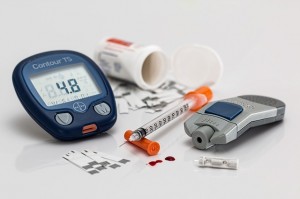NATIONAL DIABETES AWARENESS MONTH
 November is National Diabetes Month, just like having a yearly physical, November is a perfect time to remind people with diabetes how important it is to take care of their eyes. Everyone with diabetes, type 1 and type 2, are at risk for diabetic eye disease, a leading cause of vision loss and blindness.
November is National Diabetes Month, just like having a yearly physical, November is a perfect time to remind people with diabetes how important it is to take care of their eyes. Everyone with diabetes, type 1 and type 2, are at risk for diabetic eye disease, a leading cause of vision loss and blindness.
Unfortunately, diabetic eye disease often has no early warning signs so people with diabetes might not even know they have an eye disease until it progresses and they start to notice problems with their vision.
You are at increased risk for developing pre-diabetes and type 2 diabetes if you:
- are 45 years of age or older
- overweight
- have a parent, brother or sister with diabetes
- have a family background that is African-American, Hispanic/Latino, American-Indian, Asian-American, or Pacific-Islander
- had diabetes while pregnant (gestational diabetes)
- gave birth to a baby weighing 9 pounds or more
- or are physically active less than three times a week
Some types of eye problems people with diabetes may have may include: cataracts, clouding of the lens of the eye, diabetic retinopathy, damage to blood vessels in the retina, glaucoma, or damage to the optic nerve. There are 7.7 million people ages 40 and older that have diabetic retinopathy and it is projected that number will reach 11 million people by 2030.
There are often NO early warning signs, but 95% of severe vision loss from diabetic retinopathy can be prevented by early detection, timely treatment, and appropriate follow-up.
The longer you have diabetes, the higher your risk of getting diabetic eye disease. Early detection for eye disease is done through a yearly comprehensive dilated eye exam.
Take control of your health and particularly if you are diabetic, your diabetes. Get a comprehensive dilated eye exam at least once a year. Take your medications. Reach and maintain a healthy weight. Add physical activity to your daily routine and control your blood sugar, blood pressure, and cholesterol. Kick the smoking habit. Only YOU can make these changes in your lifestyle.
Taking steps to take care of yourself today can lead to an improved quality of life tomorrow.
About the author: John D. Bissell, owner of Bissell Eye Care and Tri-State Low Vision Services, offers comprehensive eye examinations for the entire family, ocular disease detection and treatment, eye glasses, sun glasses, active wear, contact lenses, and low vision examinations for those with significant vision loss. He has undergone specialized training for treatment of low vision by the International Academy of Low Vision Specialists utilizing customized telescopic eyeglasses, prisms and telescopic implants for patients who qualify. The practice accepts most types of vision and health insurance plans.
